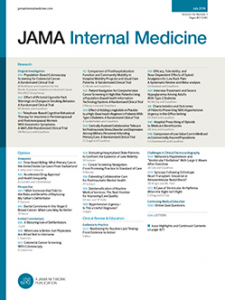Researchers have retracted and replaced a 2014 paper in JAMA Internal Medicine after realizing a number of errors had affected the findings.
The authors note the mistakes do not have a significant impact on the overall proportion of heart patients who participated in cardiac rehab. However, a number of findings were affected, such as the difference in participation in cardiac rehab defined by race, and how the overall participation has changed throughout the years.
Therefore, JAMA Internal Medicine has published a lengthy notice of retraction and replacement, which explains the errors made in the original paper, and updated the first paper with a new version of the study.
The retraction and replacement notice, issued this week, starts:
We write to report a series of pervasive errors in our Research Letter, “Cardiac Rehabilitation Use Among Veterans With Ischemic Heart Disease,” published in the October 2014 issue of JAMA Internal Medicine.1 The errors, once corrected, result in changes to a number of findings. Thus, we have requested that the original article be retracted and replaced.
The 2014 paper, “Cardiac Rehabilitation Use Among Veterans With Ischemic Heart Disease,” has been cited twice, according to Clarivate Analytics’ Web of Science, formerly part of Thomson Reuters.
As part of the original study, the authors included participants who had gone through cardiac rehabilitation — an intervention for patients diagnosed with heart diseases — after hospitalization. But, as the authors note, they missed a large number of patients in their cohort, who were eligible for cardiac rehab (CR), by not querying all relevant codes to identify patients. As such, the number of actual eligible patients were 88,826, instead of their original number of 47,051. The authors note:
Despite the almost doubling of eligible patients included in the study in the corrected analysis, there was only a small change in the proportion of patients participating in CR (from 8.5% to 10.3%)…
However, as the authors — led by first author, David Schopfer, who is based at the University of California San Francisco — write, several other findings are changed:
In the original article, we reported no statistically significant in CR participation by race, but the corrected version shows a difference: “10.4% of whites (7126 out of 68 259) and 9.8% nonwhites (1610 out of 16 397) received any CR (P = 0.02).”
Furthermore, the original version of the study suggested that patient participation in cardiac rehab increased from 7.5% to 9.4% from 2007 to 2011, but the study’s new version suggests that participation remained between 8.5% and 8.7% in that time period.
In addition, the authors note that
…there are a number of changes in the results of the multivariate model that assessed participant factors associated with participation in CR, with associations changing statistical significance for participants with income greater than $33,000 and those with heart failure, stroke, peripheral vascular disease, chronic obstructive pulmonary disease, and depression.
Nevertheless, the overall conclusions of the study remain unchanged, according to the authors, who go on to say:
Both the presence of an on-site CR program and patient proximity to a [Veterans Affairs] facility were associated with greater participation in CR; however, participation was low regardless of the presence or absence of an on-site program.
The authors end:
We sincerely regret these errors as well as the confusion caused to the readers and editors of JAMA Internal Medicine. The text, table, Figure and eTables of the original article have been corrected and replaced online. An online supplement has been added that includes a version of the original article with the errors highlighted and a version of the replacement article with the corrections highlighted.
We’ve noticed a recent trend of “retract and replace” by publishers, both in JAMA papers and The Lancet. Annette Flanagin, executive managing editor and vice president, editorial operations at The JAMA Network, told us earlier this year the publisher uses the tool for articles affected by “honest pervasive error,” for which corrections won’t suffice.
Rita Redberg, editor of JAMA Internal Medicine from the University of California San Francisco, told us the authors flagged the errors with the paper, and the journal believes them to be honest mistakes. With this in mind, we’d like to give the authors of this paper credit for “doing the right thing.”
Like Retraction Watch? Consider making a tax-deductible contribution to support our growth. You can also follow us on Twitter, like us on Facebook, add us to your RSS reader, sign up on our homepage for an email every time there’s a new post, or subscribe to our daily digest. Click here to review our Comments Policy. For a sneak peek at what we’re working on, click here.
